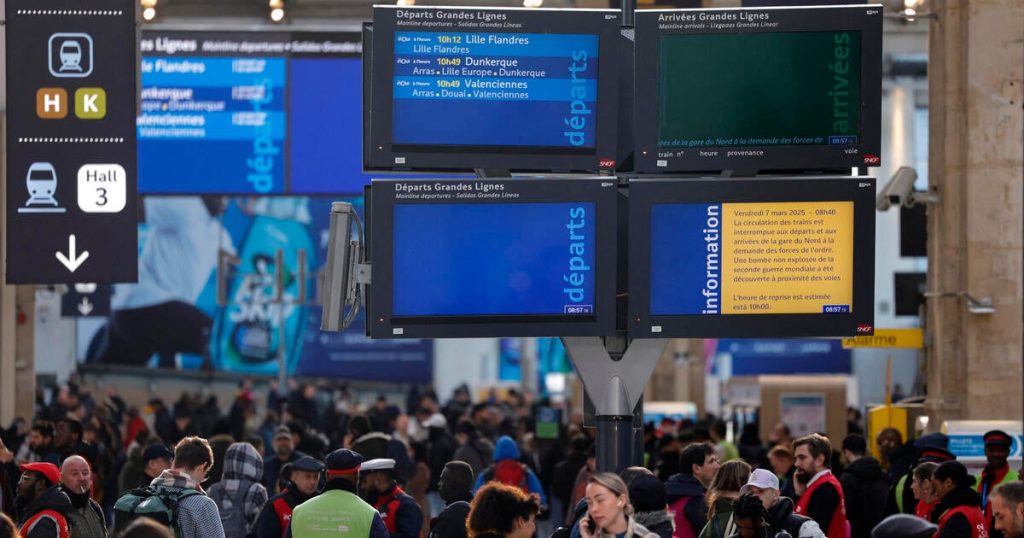On Friday, a significant disruption occurred at the Gare du Nord station in Paris due to the discovery of an unexploded World War II bomb. This finding prompted the French national train operator, SNCF, to halt all Eurostar services to and from London, as well as other northbound train services. Authorities are actively working to neutralize the bomb, with officials advising travelers to reschedule their journey amidst ongoing safety precautions.
| Article Subheadings |
|---|
| 1) Discovery of the Bomb Near Gare du Nord |
| 2) Impact on Train Services and Travelers |
| 3) Response from French Authorities |
| 4) Historical Context of WWII Bomb Discoveries |
| 5) Reassurances and Safety Precautions |
Discovery of the Bomb Near Gare du Nord
The early hours of Friday saw the discovery of an unexploded bomb linked to World War II in the Seine-Saint-Denis region, close to Gare du Nord, a critical hub for the French railway system. The bomb was unearthed around 4 a.m. by construction workers engaged in earth-moving tasks near the train tracks. This unexpected find immediately raised concerns and prompted the authorities to take swift action to ensure public safety. Law enforcement and bomb disposal units were dispatched to assess the threat and manage the situation, reflecting the urgency and severity of the discovery.
Impact on Train Services and Travelers
In response to the bomb threat, the SNCF announced a complete shutdown of rail traffic in the area, which severely impacted services connecting London with Paris, as well as other northern destinations. Eurostar, the high-speed train service operating through the Channel Tunnel, canceled all trains between London and Paris for the day. This decision affected thousands of travelers, as Friday is one of the busiest travel days for weekend getaways. The service interruption prompted many to flock to the station, seeking alternative arrangements or rebooking their tickets amidst the chaos.
Response from French Authorities
French Transport Minister Philippe Tabarot addressed the situation publicly, emphasizing the likelihood of extensive service disruptions throughout the day. Stating that limited service might resume in the afternoon, he urged travelers to defer their trips when possible. The ministry coordinated with the local police and emergency services to implement safety measures and facilitate a controlled environment for the ongoing bomb disposal operations. A containment zone was established around the area to prevent public access, thus ensuring the safety of commuters and bystanders while experts evaluated and dealt with the bomb discovery.
Historical Context of WWII Bomb Discoveries
The finding of unexploded ordnance from World War II is not an unusual occurrence in France, which has a long history of such incidents. Many bombs and munitions were left behind after the war and remain buried across the country, posing potential risks in urban areas where construction and excavation activities are common. While such discoveries are often dealt with efficiently by trained professionals, situations like the one at Gare du Nord are particularly alarming due to the dense population and the high volume of travelers at such transit hubs. This incident serves as a reminder of the lingering impacts of historical conflicts on modern society.
Reassurances and Safety Precautions
In the wake of the bomb discovery and the subsequent disruption, Philippe Tabarot reassured the public that there was no immediate risk of an explosion affecting local residents or individuals near the station. He underscored the rigorous safety protocols established for the disposal and removal of such devices, aiming to alleviate fears among the public. Authorities assured that well-trained minesweepers were on-site working to neutralize the threat, and they encouraged calm, stressing that the necessary procedures were in place to manage the situation safely.
| No. | Key Points |
|---|---|
| 1 | An unexploded World War II bomb was discovered near Gare du Nord in Paris. |
| 2 | The French transport operator, SNCF, halted all Eurostar services and other train lines due to safety concerns. |
| 3 | Transport Minister Philippe Tabarot advised travelers to postpone trips amidst significant disruptions. |
| 4 | Discoveries of WWII munitions are relatively common in France, but are concerning in high-density areas. |
| 5 | Authorities assured the public of safety measures being effectively implemented by trained professionals. |
Summary
The discovery of an unexploded World War II bomb near Gare du Nord has caused significant disruptions to train services and travel plans for many, highlighting the latent dangers posed by historical remnants of conflict. Officials have characterized the situation with urgency while assuring the public of their safety. As authorities continue their work in neutralizing the threat, travelers are advised to remain informed and, if necessary, adjust their travel itineraries in the coming days.
Frequently Asked Questions
Question: What caused the train services disruption at Gare du Nord?
The train services disruption at Gare du Nord was caused by the discovery of an unexploded World War II bomb near the tracks, leading authorities to halt operations for safety concerns.
Question: What should travelers do following the disruption?
Travelers are urged to postpone their trips and remain in contact with service providers for updates on service resumption times, as disruptions are expected to continue throughout the day.
Question: How does France typically handle discoveries of unexploded munitions?
When unexploded ordnance is discovered in France, specialized teams are dispatched to assess and neutralize the threat, following strict safety protocols to ensure the safety of the public and property.
